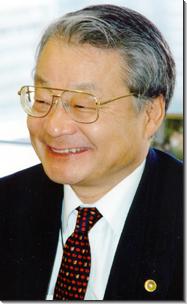 |
Mr. Hiroyuki Kawai
|
Hiroyuki Kawai was born in 1944 in the former Japanese colony of
Manchuria in northeast China. After graduating from the Faculty of Law,
University of Tokyo, he began to practice law in 1970. Today he is
president of Sakura Kyodo Law Offices, Tokyo. As a lawyer specializing
in business cases, he is active in bankruptcy cases and inter-company
lawsuits. He has also been active in social contribution activities,
such as assistance to Japanese wartime orphans who wish to move from
China, where they were left behind, to Japan, and who hope to become
naturalized Japanese citizens.
After the Chernobyl nuclear accident, Mr. Kawai
became acquainted with the late Jinzaburo Takagi, who is one of the
founders of Citizens’ Nuclear Information Center (CNIC), and acquired a
belief that nuclear power plants are the greatest destroyer of the
environment. While absorbing knowledge at CNIC and learning at the
Takagi School, Mr. Kawai became actively involved in the anti-nuke
movement. In cooperation with a close lawyer friend Yuichi Kaido, a
leading expert in lawsuits against nuclear power plants, Mr. Kawai
began to fight to shut down nuclear power plants through the courts by
involving himself in lawsuits against Hamaoka nuclear power plant in
Shizuoka Prefecture and against the Ohma nuclear power plant project in
Aomori Prefecture.
After the March 11, 2011 disaster, Mr. Kawai became
even more active in anti-nuke activities. He established the National
Network of Counsels in Cases against Nuclear Power Plants, which
consists of lawyers who have fought against nuclear power plants across
the nation. The network has now filed lawsuits against almost all
nuclear power plants in Japan. He also serves as the leader of the
counsel group for the shareholders of Tokyo Electric Power Company
(TEPCO), who claim compensation of 5.5 trillion yen, the largest
compensation claim in Japanese history. For the Fukushima Nuclear
Disaster Criminal Complainants Group, which pursues the responsibility
of alleged wrongdoers, including TEPCO executives, in the March 11
accident and ensuing damage, he serves as the attorney representing
14,716 complainants. At rallies and gatherings against nuclear power
generation, he captures the attention of people as a fascinating
speaker. Furthermore, believing that Japan as a state should steer
toward independence from nuclear power, he works as the representative
secretary to the National Network for the Legislation of the Nuclear
Power Generation Abolition Law. He is thus actively rushing around day
in and day out to realize a society independent of nuclear power
generation.
His schedule is extremely tight and timed by the
minute. He attends multiple meetings a day on anti-nuclear activities,
appears in the courts, and responds to interviews by mass media and
small independent media, treating all media equally. “To shut down
nuclear power plants, I would even collaborate with the devil.” Saying
so, he deftly meets with various people, well-known or unknown, and
visits various places, ignoring the concerns of the people around him.
Handling business cases as well, he is extremely busy and has virtually
no days off. However, he is an extremely cheerful and positive person
and says, “I am enjoying my life now more than ever!”
Even with his very tight schedule, he does not give
up on his many interests, including riding a three-wheeled
Harley-Davidson, traditional Noh plays, and group singing. He appears
at the office in kimono at the New Year and in yukata in summer. He
sometimes appears in jeans.
Mr. Kawai sometimes makes unreasonable demands on
people around him, surprising and bothering them. Because he makes
phone calls at all times, even late at night or on holidays, he tends
to be taken as self-centered or short-tempered. However, he is liked
both by citizens and by the staff of his office. This is because he is
innately cheerful and forgetful of anger, thinks positively, and always
works seriously and honestly.
His current opponent is the Japanese nuclear
village. It is a gigantic profit-making structure occupying 60% to 70%
of the Japanese economy, consisting not only of electric power
companies but also of general construction companies, banks, trading
firms, manufacturers, mass-communication companies, researchers, and
politicians. However, Mr. Kawai says: “We will never give up however
many times we lose. We will continue to fight until we win.”
Encouraged by the powerful stance of Mr. Kawai, we
individual staff members who support him intend to continue to fight
against nuclear power generation from our respective standpoints.
* Anti-Nuke Secretary to Hiroyuki Kawai

